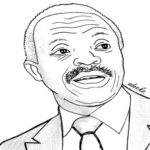POEN is a literary outfit established with the aim of propagating the writing, reading and performance of poetry. Since its inception in 2004, it has been a platform where poets and lovers of poetry converge to exchange ideas.
The president of POEN, Ebika Anthony, said the festival was in honour of a literary giant who had made his mark on the African literary and artistic landscape.
“On one hand, our giant is Femi Osofisan, a foremost playwright and an exemplary essayist. On the other hand, he is Okinba Launko, a spectacular poet and a well-cherished prose writer of social commitment fame,” Anthony said.
At a critical point, bearing the theme of the maiden festival in mind, the question “What is Poetry?” was asked. This simple question generated provoking responses. Scholars, critics, teachers and students of poetry lent their voices to it.
“Poetry enriches our souls with profound lines of wisdom and grants us the license to speak to the consciousness of the king and society,” Professor Sunday Ododo of the University of Maiduguri, intoned.
A literary theorist and critic from the University of Ibadan, Martins Ndubuisi, responded: “Poetry speaks to power and wielders of power need the interpreters to arrest its satiric plunge.”
Dr Chris Omotosho of the Federal College of Education, Abeokuta, perceived it as, “The power that evokes emotion, pity, sorrow or joy through the use of well-crafted words. This is what makes it possible for poetry to be effective in addressing any issue or subject.”
After several minutes of poetry reading, art performance, drumming and musical entertainment, the keynote speaker, Ropo Ewenla, mounted the podium for his lecture, entitled “Poetry Against Dictatorship,” which bore the same title with the theme of the festival.
Ewenla is an art performer and Deputy Director of theUniversity of Ibadan Media Centre. Given his literary and scholastic prowess, he was, no doubt, the right man for the job.
The permeable to his lecture was captivating. He stated that it was a miracle that in this techno-fascist world where words are faster than thoughts, poetry still thrives.
He stressed that the African continent had had its fair share of dictators.
Armed with Odia Ofeimun’s daring titles, “I Will Ask Questions with Stones If They Take My Voice” and “Go Tell the Generals,” as well as some inferences from other notable poets like Niyi Osundare, Remi Raji, Tade Ipadeola, Kunle Okesipe, among others, Ewenla painted a gruesome picture of life and existence in a despotic government.
“These situations make people go to the extreme of their emotions. In so doing, battles that cannot be waged at the barricade are waged with poetry,” he said. He further added: “When poetry confronts power with the putrefaction of its poise, it is most likely to elicit unsavoury consequences.”
In his closing remarks, Anthony said that FOLFEST is an annual festival, and that he looked forward to seeing more poets and writers in its 2019 edition.
After Ewenla’s lecture and some live musical interludes, the celebrant, Femi Osafisan was peered “from the lenses”. Those who viewed him from the lenses had different opinions about him.
Professor Francis Egbokhare, President of Nigerian Academy of Letters, described him as “My elder brother, closer to me as one who mentors me on how to remain sane in a world that has become a stage for all that is bizarre.”
Freeman Okosun, Associate Executive of Publishing Open Institute, Ibadan, regarded him as one “Who by his actions, continues to positively influence our generation with words and works.”
After “from the lenses”, the book “The Writer, Novel Visions and Possible Dreams: A Conversation with Okinba Launko” by Ebika Anthony, was launched. This intriguing book was a product of the literary dialogue between Anthony and Femi Osofisan, also known as, Okinba Launko.
Anthony rightly put it this way: “When it comes to drama, this great and highly respected author bears Femi Osofisan, and when it comes to poetry, he bears Okinba Launko.”
After the book launch, Emeritus Professor Femi Osofisan graced the podium. He thanked Anthony and POEN for honouring him with the festival. However, in what almost seemed like another lecture, he brought a new dimension into the dictatorship discourse. While acknowledging that the usual interpretation of dictatorship is about political power, he stressed that there is also a dictatorship of self.
“What we are suffering from, at the moment, is that kind of dictatorship. We thought we have gotten rid of the military. Everybody knows that the military is gone, but we do not really have freedom,” he lamented. “All of us have to rise up against this new dictatorship, this dictatorship of greed, avarice and selfishness.”
Osofisan’s wife, a professor of computer science and the Director of University of Ibadan School of Business, Adenike Osofisan, was also at the occasion. While speaking about what it takes to live with a write who writes about politicians, she said she lives in the two words: the world of politicians because her father was a politician, and the world of writers because her husband is a writer.
“I will tell you that artists are very humane but when they are in the world of their own, do not disturb them. Apart from that, when you read what they write about, you will know they have the society in mind,” she said. However, she added, “As wives of politicians fear for their husbands, wives of poets and writers also fear for their husbands. Politicians fear EFCC, but writers fear the state that can pick them up at will.”






